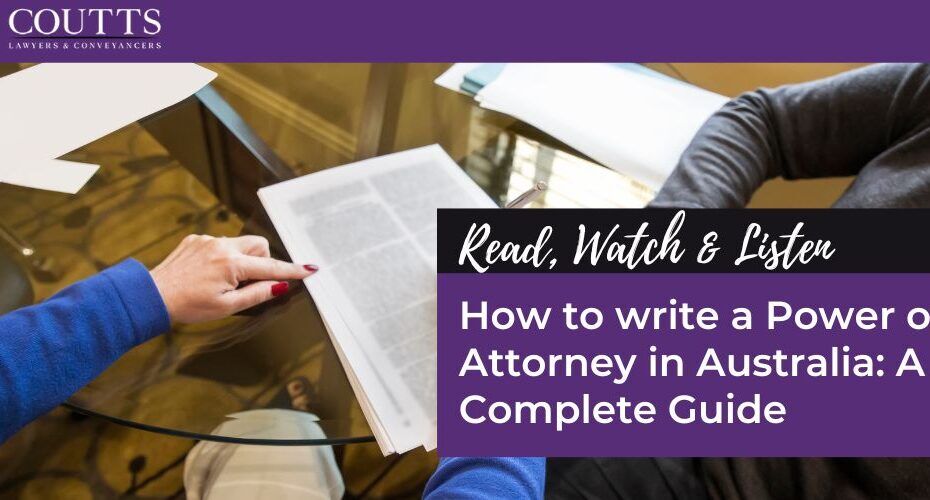KEY TAKE-OUTS:
- There are two types of Powers of Attorney, General and Enduring.
- A Power of Attorney is for financial and legal decision making.
- You can have more than one attorney.
- Your attorney cannot use your money without your authority.
Have you heard the term “Power of Attorney” but don’t really understand what it is? Here is your complete guide on how to write a Power of Attorney in Australia.
What is a Power of Attorney?
A Power of Attorney is a legal document that authorises another person (“attorney”) to make decisions on your behalf.
What type of decisions can an attorney make?
A Power of Attorney authorises the attorney to make financial and legal decisions on your behalf.
Common examples being operating your bank account, paying your bills, buying and selling shares and real estate property.
It does NOT authorise the attorney to make health and lifestyle decisions. If you want to authorise someone to make these decisions for you, you will need to appoint a Guardian in a separate Appointment of Enduring Guardian document.
Why would you need someone to make decisions for you?
There are two types of Power of Attorney:
-
General Power of Attorney
A General Power of Attorney is usually granted for a period of time. A common use is if you are going overseas and foresee that you may need to sign original documents for example, for the sale of your investment property. You can appoint an attorney to sign on your behalf rather than having to have the original documents mailed to you to sign and return.
The document expressly states the period of time the General Power of Attorney is in operation.
Should you lose your mental capacity and are no longer able to make decisions for yourself during the period the General Power of Attorney is in operation, the document is no longer valid.
-
Enduring Power of Attorney
An Enduring Power of Attorney continues to be effective even if you lose mental capacity after the document is signed by you.
It will therefore remain in place until you pass away, unless you revoke it before you die.
How do I get a Power of Attorney?
Each State and Territory in Australia has its own legislation in relation to Power of Attorney.
In NSW, the Powers of Attorney Act commenced in 2003 (“Act”).
A General Power of Attorney must be signed by you in the presence of an adult witness who is not the person you are appointing as your attorney.
For an Enduring Power of Attorney to be valid, you must sign the Enduring Power of Attorney in the presence of a prescribed witness. Your prescribed witness also signs a certificate to say that they explained the document to you, you understood it and signed it in the presence of the prescribed witness.
There is a list of who is a prescribed witness in the Act but most commonly it is a solicitor, Registrar of the Local Court, a licensee under the Conveyancing Licensing Act or an approved employee of the NSW Trustee and Guardian.
Can you use a Power of Attorney written in one State in another State or Territory?
Generally, States and Territories recognise Powers of Attorneys of other States and Territories.
In New South Wales, provided a Power of Attorney complies with the laws and rules in place in the State it was prepared, it will be recognised in New South Wales.
If you have a Power of Attorney prepared in New South Wales and your attorney wishes to use it in another State or Territory, they should ensure that they check the laws in the relevant State or Territory where they wish to use it and seek legal advice in that State or Territory as necessary.
Powers of Attorney written overseas are not recognised in New South Wales.
Who should I choose to make decisions on my behalf?
Given the nature of the decisions that the attorney will be making on your behalf, you should ensure that your attorney is a trusted family member or friend.
People who are married or in de facto relationships usually appoint each other, as there is no automatic right as a spouse to manage the financial or legal affairs of your spouse, other than in relation to jointly held assets.
People not in relationships usually appoint adult children, parents, siblings or friends.
If you do not have a suitable person, you can appoint the New South Wales Trustee and Guardian or a private trustee organisation to act on your behalf. Additional management fees will however be incurred.
Do I need more than one attorney?
You can appoint one attorney only however it is advisable to also have a substitute attorney just in case the original attorney passes away or loses mental capacity themself.
You can also appoint more than one original attorney. You must then decide whether you wish for the attorneys to be appointed jointly, which means all attorneys must make all decisions together, or whether the appointment is joint and several, which means any one of the attorneys can act alone, as well as together.
If it is a joint appointment, if one of the attorneys dies, resigns, or is incapacitated, the document is no longer valid. You can however expressly say in the document that you do not want the document to be invalid in these circumstances and that you wish for the other joint attorney to continue to act on your behalf.
When will my attorney start acting as my attorney?
You decide when you want your attorney to start acting on your behalf, depending on your circumstances.
You can choose for the Power of Attorney document to start:
- Immediately (which means the attorney can act on your behalf even though you are still of sound mind),
- When your attorney considers you need assistance managing your affairs (your attorney determines whether they should step in and start making decisions for you),
- When a doctor considers you need assistance managing your affairs and signs a document to that effect (your attorney or a family member will take you to be assessed by your doctor who decides whether your attorney ought to start making decisions on your behalf).
Can my attorney use my money for themselves?
The attorney cannot use your money for themselves unless you expressly say in the document that they can.
It is common for husbands and wives to allow each other to use their money for the other’s benefit.
For example, John (husband) is Mary’s (wife) attorney. Mary has a bank account in her sole name. Mary has said in her Power of Attorney that John can benefit from being her attorney. John is therefore able to use Mary’s money to pay an electricity bill in his name for electricity supplied to their house.
It is also possible for the attorney to use your money for third parties if the document expressly allows this to happen. A common example of this would be if John and Mary had children under the age of 18. John could then also use Mary’s money to pay the children’s school fees.
Are there any restrictions on what an attorney can use my money for if I have allowed them to benefit themselves or third parties?
Under the Powers of Attorney Act 2003 (NSW) an attorney authorised to benefit themselves or third parties can only do so in respect to the following expenses:
- Housing,
- Food,
- Education,
- Transportation,
- Medical care and medication.
The benefit cannot also be more than what is reasonable having regard to all the circumstances, in particular your financial circumstances and the size of your estate.
Can I place any other restrictions on the attorney?
You can restrict the decisions your attorney can make on your behalf.
You can prevent your attorney from making decisions with respect to certain assets or only making decisions in relation to certain other assets. For example, you cannot make decisions regarding my real estate property, or you can only operate my bank accounts.
Many people however prefer for their attorney to have a broad decision-making ability to ensure the attorney can consider all options available to make the most appropriate decision having regard for the relevant circumstances at the time.
How do I know my attorney will do the right thing?
After you have signed the Power of Attorney document giving the authority to your nominated Attorney, the Attorney must sign the acceptance contained within the document before being allowed to use it.
The Attorney must accept the following matters:
- To always act in your best interests.
- To keep their own money and property separate from yours.
- To keep reasonable accounts and records of using your money and property.
- They understand that unless expressly authorised, they cannot gain a benefit from being your attorney.
- To act honestly in all your legal and financial affairs.
What happens if the attorney doesn’t do the right thing?
Failure to do any of the above may incur civil and/or criminal penalties.
Powers of Attorney can be reviewed, varied or revoked by a Court or Tribunal.
In New South Wales, applications can be made to the Civil and Administrative Tribunal and the Supreme Court.
Fraudulent behaviour by an attorney can also be reported to the Police.
Can I change my Power of Attorney?
Yes, you can change who you have nominated as attorney or the terms of their appointment at any time by revoking the old Power of Attorney and making a new one.
Unlike a Will, making a new Power of Attorney does not automatically revoke the old one. You must either state within the new Power of Attorney that you revoke the old one, or sign a separate Revocation of Power of Attorney document.
You must also ensure that you notify any person affected by the revocation, otherwise they could mistakenly use the Power of Attorney against your wishes.
If a person knowingly uses a Power of Attorney after they have been notified of the revocation, this is an abuse of the Power of Attorney and appropriate action may be taken as outlined above.
What happens if I don’t have a Power of Attorney?
Should you no longer be capable of making decisions about your financial and legal affairs and you have not got a written Power of Attorney in place, a person who wishes to act in this role on your behalf must apply to the New South Wales Civil and Administrative Tribunal seeking to be appointed as your financial manager.
This is a lengthy and time-consuming process in which the person has to prove to the Tribunal that they are the most suitable person to be appointed.
Any other interested person may also oppose the appointment and/or seek that they or another person or organisation be appointed instead.
The result may be that a person or organisation is appointed that is not who you would have chosen.
In Summary
There are many components that need to be right to ensure you have a valid Power of Attorney in place and it is used correctly.
The best way to protect yourself is to instruct a solicitor to draw up the Power of Attorney for you. Coutts Lawyers and Conveyancers are willing to assist you. Please contact our friendly Estate Planning team for an appointment.
For further information please don’t hesitate to contact:
info@couttslegal.com.au
1300 268 887
Contact Coutts Lawyers & Conveyancers today.
This blog is merely general and non-specific information on the subject matter and is not and should not be considered or relied on as legal advice. Coutts is not responsible for any cost, expense, loss or liability whatsoever in relation to this blog, including all or any reliance on this blog or use or application of this blog by you.



